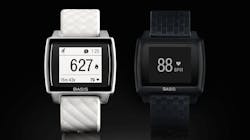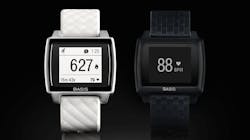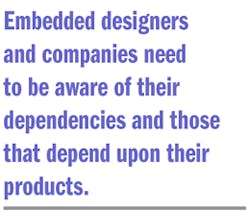Basis Peak: Buy an IoT or High-Tech Device, Get a Recall Refund
Intel’s Basis Peak smartwatch (see photo) is the latest Internet of Things (IoT) device to be hit with a major recall. Unfortunately (or fortunately for me), I have been wearing a Basis Peak almost since it came out. It has been a great device with a nice app that includes sleep monitoring support that I have used. I am going to miss it and will have to hunt around to find a suitable replacement. All the Basis Peak smartwatches have been recalled for a full refund due to overheating issues.
The Basis Peak has an overheating problem. As with many recall issues, it is not something that is happening to every device…yet. Still, it could potentially be dangerous, which is why I’m glad that Intel is doing the right thing. The company did attempt to fix the device using a firmware update, but evidently the changes would have reduced the device’s functionality. It is more of a fitness band than a full-function smartphone. It did not have a plethora of apps so it will probably be easier to replace than a more sophisticated device.
Overheating and power issues like batteries are not unique. I have an older Lenovo laptop with a cooling fan that is wearing out, causing the system to shut down when all four cores start running at full speed. A few shots of canned air help, but replacing the fan is ultimately required. On the plus side, I have been using it for almost a year without too many incidents. On the other hand, the Basis Peak does not have any user-replaceable components except for the wrist straps.
Another part of the story is that the Basis Peak is a device from a company that Intel bought. It actually runs an ARM-based processor. The purchase was one way to get into the IoT arena with an otherwise nicely designed product.
The Basis Peak will be permanently “bricked” in December 2016, so keeping one is really not an option (brick is slang for making a device inoperable usually by trying to change the software so it can no longer function as desired or to be reprogrammed). On the plus side, Intel is providing a refund and paying for returning the devices. This is a lot better than many of the bricked devices I have had here. Network routers are the most common, as updates are not always what they should be. I just wish I could get my HooToo Tripmate TM01 mobile router running again after its initial update attempt.
Routers are not alone, though. Motherboards and embedded electronic devices often decide they are more useful as a brick. The big difference is that there is no cloud-based IoT component to these. The Basis Peak could, in theory, still be used as a watch if it was prevented from being bricked. However, its link to the smartphone—the Basis Peak app and the cloud that supported it—were what really made it stand out. The cloud/app/web support is also going away.
One other notable, intentional refund/recall is the Google/Nest/Resolv smart home router hub. This is another company purchase scenario where Resolv developed a smart home IoT gateway. Of course this IoT device hub has a cloud- and app-based component. The hardware would be useless when either of these components went away.
Resolv was bought by Nest, which was in turn bought by Google. The company eventually decided that it did not want to continue to support the device and subsequently recalled it, but at least it is providing a refund like Intel is doing with the Basis Peak. Unfortunately many users have integrated it into their home automation system. Replacing it is going to be a chore.
These recalled devices and discontinued services are not the first, nor will they be the last. Consider the number of MP3 and video streaming services and cloud storage services that have gone away, along with user-owned content.
Another recent problem shows how IoT in industry and infrastructure changes like these recalls will have a major impact on customers and designers. An open-source library was recently removed. It was used in many projects that were essentially bricked/broken when it became unavailable. This caused an immediate sensation when nightly builds didn’t (build). On the plus side, being an open-source project, a replacement could be created and older versions were still available, but changing all the dependent projects would be major problem.
Embedded designers and companies need to be aware of their dependencies and those that depend upon their products. This is not a new issue for this industry, which has to live with end-of-life issues for dependent components. Unfortunately, these problems will just grow as vendors become dependent upon IoT middleware and cloud-based services. Many of the discussed recalls were done to limit liability highlighting the cost of discontinuing a service or device when it will impact millions of customers.
There are no good answers to these problems, and with the number of IoT devices estimated to hit 20 billion by 2020, they will continue to grow. Many of these devices will be dependent on other devices, as well as app- and cloud-based services that need to be available throughout the lifetime of the device. Free lifetime support of a device sounds like a great deal—until that support goes away.
About the Author
William Wong Blog
Senior Content Director
Bill's latest articles are listed on this author page, William G. Wong.
Bill Wong covers Digital, Embedded, Systems and Software topics at Electronic Design. He writes a number of columns, including Lab Bench and alt.embedded, plus Bill's Workbench hands-on column. Bill is a Georgia Tech alumni with a B.S in Electrical Engineering and a master's degree in computer science for Rutgers, The State University of New Jersey.
He has written a dozen books and was the first Director of PC Labs at PC Magazine. He has worked in the computer and publication industry for almost 40 years and has been with Electronic Design since 2000. He helps run the Mercer Science and Engineering Fair in Mercer County, NJ.
- Check out more articles by Bill Wong on Electronic Design
- Bill Wong on Facebook
- @AltEmbedded on Twitter



